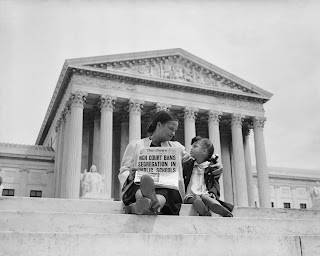Reconstruction started right after the end of the Civil War and the North and South became land of freedom. It started with a happy beginning, Lincoln released all of the slaves. This happened when Robert E Lee surrendered to General Ulysses Grant. The country was flourishing with exhilaration and all of the slaves, with their new freedom, left their plantations without even knowing where they were going. This was just the beginning of the coming jumble
In the African American's early days of freedom, the main goal for many of them was reconnection with their families.
One of the first actions that was taken for extending the benefits to the newly freed African Americans was the Freedman's Bureau. This was established to provide necessities such as food, clothing, medical services, and land.
There were rules established for every black worker was required to sign a document stating that they were working for a white boss. If they refused or failed to do this task, there would be punishments.
Congress’ response to black codes was the Civil Rights Act. This gave freedom to any African Americans born in the United States, or who planned to become citizens.
Memphis was a hot spot for this violence as it held a lot of racial hostility and as a result, there were many riots. The white mobs consisted of everyone, from poor whites to the police.
The reconstruction period was full of fluctuations of violence and freedom, happiness and destruction. The reconstruction period left a legacy of hope as well as violence.
Johnson’s reconstruction plan was the trigger of a white mob that ran through New Orleans because the whites did not like the fact that we was in support of giving the slaves the freedom they now deserved.
Things started to turn around with the rising of the thirteenth, fourteenth, and fifteenth amendments, also known as the Reconstruction Amendments, starting with the fourteenth in eighteen eighty six. This gave African American men the right to vote, a step in the right direction.
The Thirteenth Amendment put a ban on slavery in all territories. This was a great start to grant the African American's their freedom. It was a process though, despite this rule being put in place, white people still had African Americans working for them, to such an extent that they could be seen as slaves. The senate passed this Amendment in 1864, but it was not passed by the house until one year later, in January of 1865, after they originally did not pass it.
The Fourteenth Amendment came next, and this put the African American's a lot closer to becoming free. This amendment granted legal citizenship, equal, civil rights for anyone born in the United States or who became a citizen of the United States. The five concepts to this amendment protected African Americans from state action, privileges and immunities, citizenship, due process, and equal protection.
Section one dealt with the rights of African Americans, stating every African American born in the United States is subject to jurisdiction.
Section two is labeled Appointment of Representation. This gives them the rights to be considered in the equation when it comes to congress allocating each state based on the total population in each. This also prohibits congress from denying voting rights to any male citizen twenty-one or older, unless convicted of a crime.
Section three deals with disqualifications from holding office. In certain situations, such as a person who has taken an oath swearing to the constitution and has afterward participated in some sort of rebellion about it, or who have helped enemies will not be allowed to have a stance in congress. This does though, grant removal of this restriction if there is a two-thirds vote against it in both the House and Senate.
Section four is about public debt. The United States will stay loyal to its debts, but will not pay any debts that relate to rebellion or slavery.
The last, section five simply states that Congress can enforce provisions on any of the sections above.
The final Reconstruction Amendment, the Fifteenth Amendment, granted African American men the right to vote. This was a major step for the newly freed slaves because this had been consented since the founding of the nation.

.jpeg)



No comments:
Post a Comment